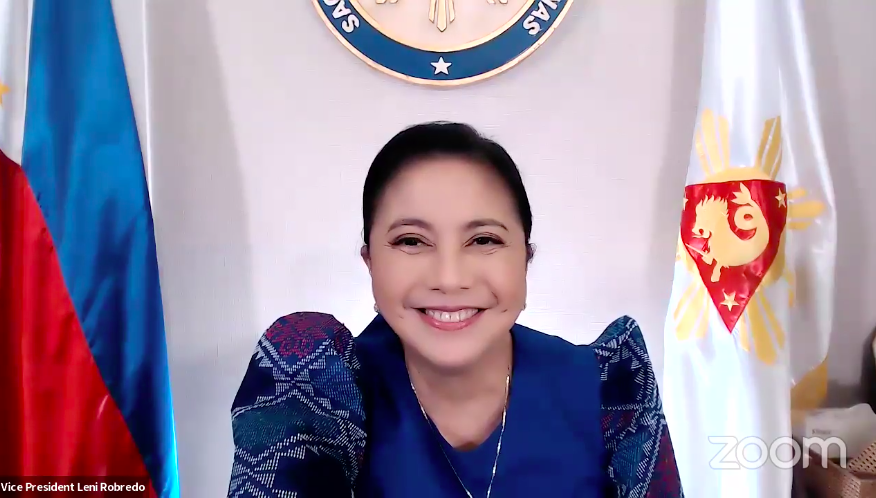
(FILE) Vice President Leni Robredo speaking before Meeting of the Rotary Club of Manila. Screengrab from Facebook / OVP
MANILA, Philippines — Vice President and now presidential aspirant, Leni Robredo on Sunday said local government units (LGUs) in the provinces were not consulted by the national government about the new lockdown policies or the alert level system.
Robredo said this after the League of Provinces of the Philippines (LPP) appealed to defer the immediate implementation of the alert level system in some provinces to November 1.
“Marami actually na LGU na nagsasabi na in-announce na pero maghihintay kami kasi hindi namin alam kung ano iyong implications,” said Robredo in her radio program.
(There are actually many LGUs that said they have been informed but decided to wait as they don’t know what the implications are.)
“So sa akin, sana ayusin ito. Pambihira, ‘di ba, pambihira na one and a half years na tayo sa pandemic, hindi pa rin natin naiintindihan ito dahil sa kung ano-ano—dahil sa papalit-palit,” she added.
(So to me, hopefully this will be fixed. It’s strange, isn’t it? It’s strange that we’ve been into the pandemic for one and a half years but we still don’t understand it because of what? — Because the policies keep always changing.)
Robredo added that many LGUs in the province do not feel included in the crafting of the lockdown policies.
“Halos sila iyong gumagawa pero hindi naman sila nabibigyan ng enough na boses para mag-contribute sa paggawa ng policy,” said Robredo.
(They are almost the ones who are working but they are not given enough voice to contribute to policy-making.)
Robredo also recalled a letter that her office wrote to presidential spokesman Harry Roque, asking the Inter-Agency Task Force to include the LPP in the decision-making processes. Roque however denied the request saying the Department of the Interior and Local Government is already represented the LGUs.
“Pero…ang daming gaps. Hindi sila napapakinggan. So hanggang ngayon, problema natin ito. Eh kung nakinig sila dati, eh ‘di sana early on nabigyan na ito ng linaw, kasi napapakinggan sila. Pero ayaw nila (national government) eh,” Robredo said.
(But there are so many gaps. They do not hear their side. So until now, this is our problem. But if they had listened before, it would have been clarified early on. But the national government refused to listen.)
“Hindi ko talaga alam kung bakit ganito iyong paglatag ng mga panuntunan na hindi klaro sa mag-i-implement,” she added.
(I really don’t know why they’re laying out rules like this that aren’t clear on how to implement.)
Robredo also said that she understands the concerns of LPP President and Marinduque Governor Presbitero Velasco Jr. over the expansion of the alert level system, adding that LGUs will need more time to implement the new quarantine classifications.
“Kailangan nila na bigyan sila ng panahon at sana ito na iyong fixed na regulation. Kung alert level, until the very end ito na iyong susundin, hindi na iyong paiba-iba,” Robredo said.
(They need to give them time and hopefully this is now the fixed regulation. If it’s the alert level system, let it be that until the end, don’t change it over and over again.)
The alert level system took effect on Wednesday, October 20, and will last until October 31, but Malacañang only announced its implementation on Tuesday.
The five-tier alert level system was first implemented in Metro Manila on September 16. Metro Manila is now at alert level 3.
Negros Oriental and Davao Occidental are now under alert level 4.
Alert level 3 was imposed in Cavite, Laguna, Rizal, Siquijor, Davao City and Davao del Norte, while alert level 2 was enforced in Batangas, Quezon province, Lucena City, Bohol, Cebu City, Lapu-Lapu City, Mandaue City, Cebu province, Davao de Oro, Davao del Sur and Davao Oriental.
RELATED STORIES
Local execs want to set own pandemic curbs
Over 5,000 households, communities in PH under granular lockdown — PNP